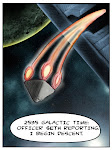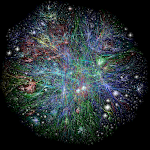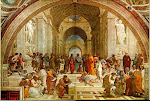Last class in L&C III we attempted a contrast between Daniel Defoe and Jonathan Swift, taking into account the particular insertion each author achieved in their social, literary and political context. We agreed that Swift’s relationship with early 18th-century British society seemed more problematic than Defoe’s. We explored the acrid sense of failure and disappointment that signed Swift’s life, and the unresolved contradictions of his spirit. But -we noticed- even if we put aside the biographical data and only focused on the author’s literary production, it could be also possible to perceive the degree to which his mind seemed fit for his society. And the same seemed to apply to Defoe.
 We noticed that Defoe’s social criticism was mainly oriented towards the fulfillment of Christian religious principles. Robinson Crusoe or Moll Flanders could function as examples of how social disruptions and personal flaws can be amended by commitment to religious values and rules. Even his caustic The Shortest Way with the Dissenters, which sent him to the pillory, was mainly a religious satire (although with deep political implications).
We noticed that Defoe’s social criticism was mainly oriented towards the fulfillment of Christian religious principles. Robinson Crusoe or Moll Flanders could function as examples of how social disruptions and personal flaws can be amended by commitment to religious values and rules. Even his caustic The Shortest Way with the Dissenters, which sent him to the pillory, was mainly a religious satire (although with deep political implications).
Swift never got to the pillory, but still his clash with society went far beyond a mere religious stance. Swift’s criticism seems to have been directed against society as a whole. Gulliver’s Travels, his incontestable masterpiece, is a minute and comprehensive dissection of Western culture and an attack against everything that is dear to the English (and European) mind, its most salient object of scorn being humanity itself.
Perhaps, it is possible to understand this contrast between Defoe and Swift as originated in a definitely opposed conception of humanity. Defoe looks backwards, to the mythical origin of humanity, when man is still the image of the divinity, and he consequently strives for the recuperation of that original (Christian) man. Contrariwise, Swift looks forward. For Swift, there seems to be no mythical past. Humanity does not appear seriously linked to any divinity, but it is, instead, the mirror of the revolting Yahoos, the trifling Lilliputians, the insubstantial Laputians, or the useless projectors in Lagado. Rather than spiritual in essence, Swift’s man is seen in his utter animality. This is present in Gulliver’s horrified depiction of the Brobdingnagians, but also in Swift’s revealing treatment of bodily functions, of which The Lady’s Dressing-room is perhaps the most enlightening example. In Swift, it is possible to infer, humanity is not really ‘human,’ but still animal.
Thus, Swift’s ideal of humanity seems to be placed at the end of a forward movement from animality (the present) to a purified, improved ‘humanity’ (not yet achieved -and perhaps, even unattainable) [1]. Clearly, the means for this purification is reason. In fact, if there is one thing that all of Swift’s writings seem to condemn, that is irrationality, even under the disguise of rational and scientific thought. Accordingly, the Master Houyhnhnm reproves Gulliver’s depiction of the atrocities of war: “He seemed therefore confident,” Gulliver retells, “that, instead of reason we were only possessed of some quality fitted to increase our natural vices; as the reflection from a troubled stream returns the image of an ill shapen body, not only larger but more distorted.”
Hopelessly aware of this reality, Gulliver feels as an exiled in his own nation. He does not fit. Crusoe or Moll Flanders, on the contrary, are triumphantly welcome by their formerly adverse societies. Swift’s and Defoe’s creations can help us bring light on how the authors’ minds were suited to their own time. While Defoe’s characters manage to find their place in the world, Swift’s heroes and situations are in a constant state of clash and tension. Where Defoe’s works find a path towards light and hope, Swift’s, on the contrary, show a flawed, irreparable world. Where Defoe sees redemption, Swift understands condemnation; where Defoe sees humanity, Swift can only perceive a damned, debased, futile race.
[1] It is possible to perceive in this argumentation a somewhat implicit, precarious Darwinist conception of humanity. Mankind would be no more than sophisticated and evolved animals. Just as the Yahoos look like degenerated human beings.
This text by Simud is licensed under a Creative Commons Attribution-No Derivative Works 3.0 United States License.
Permissions beyond the scope of this license may be available at this contact.
















.gif)





4 comments:
May be this comment might not have anything to do with Gulliver's. Anyway, in trying to work out why Swift tends to qualify humanity with animalism, the comment might have, at least, some remote connection. I watched on Telefe news programme this Friday 12th, a terrible flash of information which made me think on some people's deshumanization. The information referred to a baby which was abandoned at the door of a TV production and had remained there all the night. Fortunately, the baby miraculously survived after being found and saved by the TV procuction staff. She had been left all the cold night inside a nylon pouch without a blanket to be protected from the inclemency of the winter weather. I'm not religious whatsoever, but thanksgiving, I guess, shoud be given to God for protecting this baby and I agree with Crusoe on this. On the other hand, can we label as an animal to a person which did such a thing? I mean, a person leaving a baby disprotected and abandoned all the night. I don't believe the word animal will be the correct label. In this sense, even a mother dogs have more 'human sense' since it's rare to see them abandon their sons. Careful, I am not critizicing human mothers by this, that baby could have been abandoned by any other person. Finally, what a paradoxical situation this example shows, some humans canno't be treated as animals for their own acts of inhumanity are not at the level of these. But, some animals like mother dogs which have the human commonsense of preserving their sons, have a widder sense of humanity than some exeptional cases of inhuman humans could have.
On what you say, Néstor, perhaps the answer is that there's no such thing as a human common sense. Precisely, Swift sees that most of human actions are irrational and void of any sense. I think this is Swift's greater point all throughout his work. But he not only attacks obvious actions, as this one, he finds irrationality everywhere, even in the most 'rational' things we do. I recommend you read Gulliver's voyage to Houyhnhnmland if you are interested on the issue.
And thanks for paying a visit from time to time!
Hi, although I haven't reached yet Gullivers voyage to Houynhnmland, I am dealing with his voyage to Brobdingnag and I found several things that are interesting to discuss. In this sense, in spite of being the Modest Proposal a satire, Defoe asks politicians to reflect on what should be done with the beggar's children. By contrast, in Gulliver's Travels, he is carried in a box by the farmer's daughter to visit Brobdignag where he describes the beggars in his own literal words: as 'giving the most horrible spectacles that ever an English eye beheld.' On the other hand, he critizices humanity satirizing himself representing like a bird caught inside a box ready for human entertainment. Even more, he reveals the mind of the farmer who found Gulliver for the first time in Brobdingnag and who does not hesitate to enrich himself by exposing Gulliver as an attaction to people, till gully gets ill and the farmer sells him to the Queen as though he were a mere commodity object.
Hi Simud, after having passed half a year since I finished reading Gulliver's Travels, it is now when I can coincide with you in that Swift attacks humanity on account of the plenty irrationalities observed 'by him' in such species. In this sense, it could openly be argued that Swift's main satire refers to humankind as a whole, rather than a particular part of this. Nevertheless, what would be interesting to discuss are 2 main points: 1º- Swift's preconception of the Yahoos as irrational and foremost imperfect creatures which Gulliver abhors for being 'imperfect creatures' similar to humans. 2º- That Gulliver attacks the irrationalities of those Yahoos but does not seem to critizise the forum held by the Houyhnhnms to discuss the irrational idea of massacring the Yahoos. One as reader should consider that If Gulliver hadn't been present in that forum showing himself as an idealized, perfect version of a Yahoo, then the Yahoos would have been exterminated by the Houyhnhnms. By this, let me remind you that Gulliver is constantly selling me, as reader, the idea that the Houyhnhnms are the most perfects, rational and wisest peole that any person can find in the world.
Post a Comment